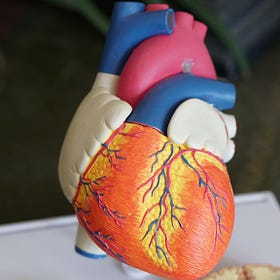What's The Deal With CoQ10 In Our Bodies?
Otherwise known as ubiquinol or ubiquinone, how does it contribute to the biochemistry in the human body?
A majority of the human population in today’s modern society is tired and overworked. I feel like that too sometimes - there are all these deadlines at work to meet, mortgages to pay, and the crises that come seem to be neverending.
We almost always feel tired. There’s never enough rest for the wicked or the weak.
One of the common approaches that we humans do take these days to address a flagging energy/stamina level as we age is to consume a coenzyme Q10 (CoQ10) supplement, believing that it will bring about benefits for us by improving our energy level.
Unfortunately, most people do consume CoQ10 products without even knowing what it does or how it works — they just look at the price and gauge how they feel after consuming it.
That’s not a very good gauge.
Add to that the complication that CoQ10 products may exist as the reduced form (ubiquinol) or the oxidised form (ubiquinone), and most lay people are left scratching their heads as to what all this really entails.
Because oxidation and reduction just add another layer of electrochemical complication there is already to an already complex biochemical mix - which, of course, can force the body into a state of oxidative stress:
Oxidative Stress Is An Electrochemical Concept That Focuses On An Inappropriate Rate Of Electron Transfer.
The electron is a particle that is responsible for transporting electric currents. Whenever we flick a light switch on at home, we’re connecting up a circuit that allows for the flow of electrons to power up a device that can then convert that electrical energy into light energy, such that our houses get illuminated.
It shouldn’t have to be that complicated. After all, the idea is just for them to be able to boost their energy levels. Why is there the need for so much scientific research and understanding?
The biochemistry of CoQ10
It is mentioned in this article that CoQ10:
plays a substantial role in energy production by acting as a mobile electron carrier in the electron transport chain.
What that means is that CoQ10 exists in our cells. Our cells are synthesising it continuously via the mevalonate pathway. Incidentally, the mevalonate pathway is also the same pathway that is inhibited by the use of statins in an effort to block the synthesis of fresh cholesterol within the body:
Now, Seriously, What's So Tricky About Cholesterol?
This article is the final part of a 3 part miniseries. The first 2 parts can be found at:
Side note: one who is consuming statins for high cholesterol will be facing issues with reduced cellular CoQ10 production, and that is one of the factors that weakens atherosclerotic patients over time.
The mevalonate pathway synthesises the oxidised form of CoQ10 (ubiquinone), and we have a continuous biochemical tango of oxidation and reduction occurring between glutathione, CoQ10 and other various antioxidants as the CoQ10 keeps on switching from ubiquinol to ubiquinone and back while it is transporting electrons through that electron transport chain.
All for the sake of our cells being able to generate useful biochemical energy that we can then convert into other forms of energy for moving about, lifting weights and doing all the things that a normal human being can do.
Hence, we can read about stuff such as CoQ10 being beneficial for supporting brain health as it is beneficial for supporting heart health. It is also known to support liver health.
What’s the main thing that these 3 organs (the brain, the heart and the liver) have in common?
They’re all organs that comprise living biological cells.
It makes sense that an organ can function better if the cells that constitute the organ are functioning better, because the organ is only as strong as its weakest cell. As it was said by Thomas Reid:
The chain is only as strong as its weakest link, for if that fails the chain fails and the object that it has been holding up falls to the ground.
Unfortunately, for whatever reasons, our CoQ10 production rates drop as we age.
And therefore we tend to feel weaker.
At age 50, most of us can’t see ourselves running after 5 year old children any more. They seem to have the boundless energy that we don’t have. (Some adults might be anomalous, but that’s another story altogether).
Hence some people do buy into the idea of supplementation, because that is what is being marketed out there.
Of course, though, there are ubiquinol and ubiquinone products out there.
And it isn’t really that known to people that “most supplements contain the inactive form of CoQ10, ubiquinone, which is harder to absorb than ubiquinol”, according to Medical News Today.
But that being said, both of these components aren’t very soluble in water/digestive juices, hence it is suggested here that:
whether you take CoQ10 or ubiquinol is that fact that both are fat-soluble compounds, so to significantly improve their absorption, it is important to take them with a fatty meal or in a formula that includes solubility enhancers.
Or even better still, add in a regenerating ingredient such as alpha lipoic acid, which can help to regenerate/recycle the oxidised ubiquinone back into the reduced ubiquinol form for facilitating electron transport.
But we don’t necessarily think about all that.
Most of us would assume that every CoQ10 product would contain identical formulations.
Unfortunately, they don’t. The supplement industry is such a Wild, Wild West - it’s not necessarily the case that a CoQ10 product manufactured by Manufacturer A behaves exactly the same as a product by Manufacturer B.
And the foods that are richest in CoQ10 are things that we may not really enjoy consuming, such as the hearts of various animals. (By association, the human heart also contains high amounts of CoQ10, especially when it is required to be pumping continuously for us to be alive).
Whether we’re looking at ubiquinone or ubiquinol, the main considerations are still:
How much of it are our cells producing?
How much can our digestive systems absorb from the foods or supplements that we’re consuming?
Are our energy levels being maintained or enhanced by consuming these foods/supplements?
And from there, we can work out a viable nutrition strategy to better address our needs.
If supplementation were necessary or recommended, do check out thethinkingscientist’s preferred products using the button below:
Disclaimer: This link is an affiliate link and I may receive commissions for any purchases made via this link.
Do feel free to share this article and hit the “subscribe” button to get more updates about the science concepts in nutrition and health, all deconstructed nicely for your convenient perusal!




